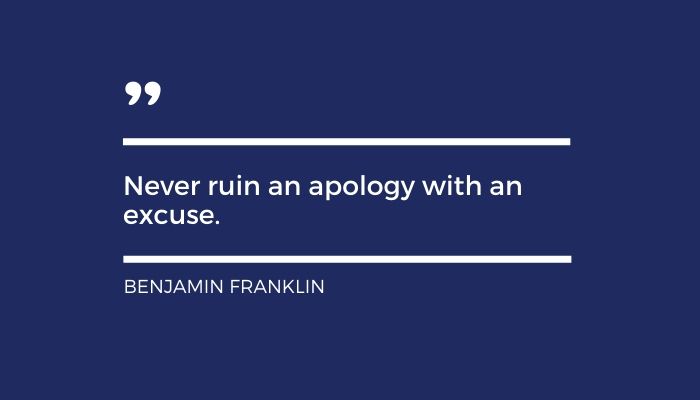Have we forgotten how to apologize? Worse, have we lost track of the incredible power of apology? Not just how to do it well, but why to do it at all?
“It was my mistake. I’m sorry. Please forgive me.” It’s important to get these phrases written down now, before they become obsolete.
Let me tell you who didn’t forget these phrases: some of my clients at Seventh Generation, Inc. A few years back, they
- Made a mistake
- Handled it with integrity, apology, and action
- Experienced great results because of their smart choice
Lucky for us, when I asked them if I could spread the word on their wise move, they graciously welcomed me to do so. So let’s dig into this.
The Power of Apology
Mistakes are messy. Problems are difficult. Worse, they often create fear about what could come next—a fear that drives people to seek to control perceptions and outcomes.
But the most reliable path to improving perception is the (easier, faster) high road of admitting the mistake and working to make it right.
In fact, I’d argue that mistakes are actually opportunities in disguise. Because when we handle them well, we can drive greater engagement, loyalty, and word of mouth.
In short: apology is your friend.
How to Apologize à la Seventh Generation Inc.
A while back, Seventh Generation messed up. But what happened next is so much more important. They handled their mess-up so beautifully that I now use them as the ultimate example of how to make a mistake, apologize, and move forward successfully.
When I asked them for the details, I learned a lot:
The marketplace knows that Seventh Generation is focused on providing environmentally sound products.
What many don’t know is that their former CEO, John Replogle, and his team and board were also dedicated to authenticity in their dealings with team members, customers, suppliers, everyone—as the company continues to be to this day.
In October 2012, Seventh Generation baby wipes were selling great, largely through Amazon’s subscription program, which allows customers to set a schedule for automatically replenishing their supply. It’s a win-win for consumer and company alike—one that’s hugely dependent on customer loyalty.
At the time, 70% of Seventh Generation’s baby wipe sales came from this program. But that was about to change.
When the company launched a new, improved wipe—one that looked different and cost more—they started shipping it to subscribers, higher price and all. Just one glitch: no one told the subscribers.
Oops.
Customers responded fast and furiously. They called, wrote, complained on Amazon, and lit up social media. Sales started cliff diving, eventually hitting 50% of prior levels.
 Now’s the time for spin, right?
Now’s the time for spin, right?
Wrong. Now’s the time to remember how to apologize.
When John Moorhead, the new ecommerce brand manager, learned that the company hadn’t communicated with customers on this matter, his first reaction was, “We need to apologize.”
Even though he was relatively new to the scene, Moorhead knew of the company’s commitment to transparency and understood its importance.
The company launched a campaign of personal notes, phone calls, and responses to feedback, social media, and press. The message was simple: “We messed up, we’re sorry, and we’re fixing it as fast as we can.”
Replogle himself publicly described the oversight as a mistake. That’s not a word you hear CEOs using often enough—but it’s a term that great leaders don’t shy away from for a minute.
Within 12 months, sales had recovered, the team had learned much about how their customers viewed wipes, and the company had institutionalized the communication fix.
In short, from adversity and authenticity—as well as the corresponding and necessary apology—came advancement.
Seventh Generation’s commitment to authenticity is so strong that communications manager Brandi Thomas actually had proud memories of this blunder:
“As a PR person, I don’t always get to call the Wall Street Journal to tell them I want to share one of our mistakes, so this story is one my favorites,” she told me.
Let’s hear it for strong corporate vision. And for the power of apology.
The Ugly Truth about Falsehood
For a few decades now, the popularity of spin has elbowed out the use of a simple, honest apology.
The term “spin” comes from the practice of spinning a yarn, telling a story, sharing fiction. In other words, “spin” relates to something made up. A.k.a false.
It’s not as if leaders everywhere are sitting around and dreaming up ways to sew falsehood. But things go wrong. Companies make blunders. People mess up. The variable isn’t whether things will go wrong. It’s how you’ll deal with it when they do.
At times, the “reasons” for choosing spin can seem pretty tempting—even altruistic. For example:
- We can’t afford bad publicity.
- We need to frame this so fewer people are defamed.
- We are a litigious society. We can’t admit this; we’ll be sued.
- We should keep quiet or the media will drag us through the mud.
The list goes on.
Stop. Think about what’s ahead: more positioning, more “managing perception,” less credibility for your name.
When the spin is exposed or called into doubt, you hit a slippery slope: add new information to assuage doubt, explain what you “technically” meant when you first said X, trip, slip, fall.
Suddenly, one “oops” moment has created big ripples. The law of unintended consequences is constantly in effect.
Once it gets messy enough, you throw your hands in the air and go for what I call a redirected apology. Also known as a non apology, nonpology, or fauxpology, this is an apology that attempts to deflect all responsibility away from yourself, often onto the audience.
In other words, it’s not an apology at all.
- “I’m sorry you misinterpreted my meaning.”
- “I apologize that my attempt to fix this backfired because of what he did.”
- “I’m sorry that you were offended by what I said.”
Maybe some people call that an apology. I call it a thinly veiled attempt at scapegoating.
The more you do this, the more calloused your audience becomes. And the more your credibility crumbles.
The Solution & Its Outcome
Let’s go back to the beginning of all this. What if, at the moment you had realized you goofed up, you had skipped the spin and remembered the power of apology.
“I’m sorry. I didn’t mean to create confusion/frustration/etc., but I made a mistake. I hope you’ll forgive me, but forgiven or not, I’m going to see if it can be fixed. And I will personally report back to you.”
In those rare cases where we see leaders show honest contrition, without spin, the story tends to die very quickly. Or, better yet, it turns positive, reflecting on the honesty, as in the Seventh Generation example.
And don’t forget that you can choose authenticity at anytime, even if you opted for spin early on and are already buried in your own mess. Better late than never.
Authenticity can be hard. Apologizing is humbling. But humility builds wisdom. That’s the simple, honest truth. No apology necessary.
Author’s note: the power of apology is not only a concept I’ve coached on for years, but also one I’ve written about before, in a similar post published on Great Leadership a few years back. Thanks to Dan McCarthy for helping me share this important message with his audience as well.




Leave a Reply